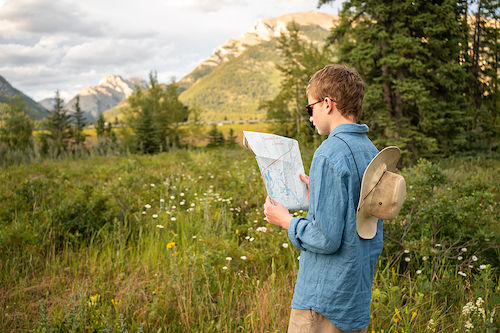 Time spent outside and nature-based activities could counteract some of the negative mental health impacts of COVID-19 on adolescents.
Time spent outside and nature-based activities could counteract some of the negative mental health impacts of COVID-19 on adolescents.
Researchers from North Carolina State University found that outdoor based activities helped teens cope with major stressors, and restricting such opportunities could have negative mental health implications.
“The COVID-19 pandemic has disrupted people’s daily lives and routines around the world. These disruptions have both created stress and taken away some of our most important ways to cope with stress, like seeing loved ones. These disruptions may have particularly profound consequences for adolescents because they are at an age when they are particularly susceptible to the impacts of stress,” Brent Jackson, lead author of the study and a graduate student in the Fisheries, Wildlife and Conservation Biology Program at NC State told Theravive.
In undertaking the study, the research conducted a survey between April 30 and June 15 2020. 624 adolescents aged between 10 and 18 were asked to report their participation in outdoor activities before the pandemic and during the time when social distancing restrictions were in place in the United States. The participants were also asked about their wellbeing, how happy they were and their mental health.
“Of the 624 youth we surveyed for this study, 64% reported declines in their participation in outdoor activities and 52% reported declines in their mental well-being. But, we found that youth who got outside frequently before the pandemic and those that were able to continue to get outside during the pandemic were buffered against declines in their mental well-being. In fact, those with high outdoor participation rates were able to maintain pre-pandemic mental well-being levels,” Jackson said.
Almost 77 percent of the teens surveyed believed time spent outdoors helped them cope with the stressors of the COVID-19 pandemic.
When the researchers categorised outdoor activities by type they found that participation in play based outdoor activities like sport, bike riding, walking, running and skating decline by 41.6 percent.
Camping, hiking, hunting, fishing and paddling decline by 39.7 percent and family activities outdoors declined by 28.6 percent.
“All these seemed to help buffer adolescents against declines in well-being, but outdoor play seemed to have the biggest effect. We think this may be because it’s also the easiest to do – both before the pandemic and during. Nature-based activities also had mental health benefits, but fewer people participated, perhaps because there is usually some travel associated with getting to a park or other natural area. This suggests that promoting access to nature may also help boost mental health among adolescents,” Jackson said.
“Family-based activities had the weakest association with maintaining mental health. We think this may have to do with adolescents’ social circles being restricted to immediate families during the pandemic. It could be that added time with family may not have added much additional benefit,” he said.
During the early stages of the pandemic, 60 percent of the teens surveyed said they were able to go outside only once a week or less.
The researchers say their findings are an important reminder to policy makers to prioritise allowing time spent outdoors during COVID-19 restrictions.
“We found the drops in mental well-being fairly alarming, but are really encouraged by the consistent impacts that time outside can have in mitigating that. Especially as time outdoors is recognized as safe by the CDC and other public health guidance, our study offers that time outside reduces risks to mental health in a way that has low risk in terms of COVID-19 transmission,” Jackson said.
“We are glad that as we have learned more about COVID-19 transmission, more public policies, like opening parks, are allowing more opportunities for outdoor recreation. We suggest that policy makers prioritize these opportunities, especially for young people, and target outreach strategies to encourage families and adolescents to get outside.”
For parents wanting to support their adolescents and encourage time spent outside, Jackson says it doesn’t need to be complex.
“We hope parents are encouraged that getting outside doesn’t have to be complicated. Things like playing outside and going for walks, runs, and bike rides can help to improve adolescents’ mental health. These are things that can be done in backyards, neighborhoods, and local parks. Hopefully this proximity will lower barriers like not being able to supervise or transport children.”
Elizabeth Pratt is a medical journalist and producer. Her work has appeared on Healthline, The Huffington Post, Fox News, The Australian Broadcasting Corporation, The Sydney Morning Herald, News.com.au, Escape, The Cusp and Skyscanner. You can read more of her articles here. Or learn more about Elizabeth and contact her via her LinkedIn and Twitter profiles.